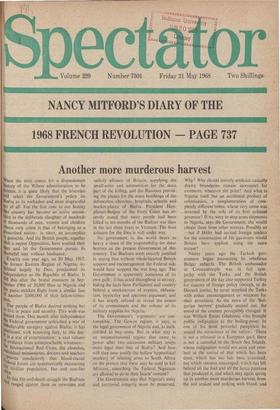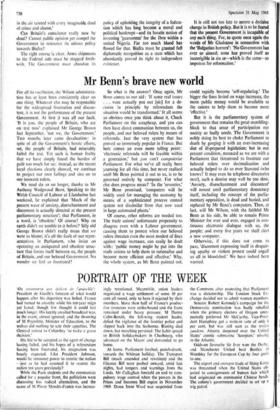Another more murderous harvest
Exactly one year ago, on 30 May 1967, ,the former Eastern Region of Nigeria, in- habited largely by lbos, proclaimed its independence as the Republic of Biafra. It did this after the brutal massacre in Sep- tnber 1966 of 30,000 lbos in Nigeria and .panic-stricken flight from a similar fate another 2,000,000 of their fellow-tribes- n, he people of Biafra desired nothing but live in peace and security. This wish was led them. One month after independence Federal government unleashed a war of lievable savagery against Biafra; it has tinned, with mounting fury, to this day. s a war of extermination: a vast volume evidence from unimpeachable witnesses— International Red Cross, the churches, Wiwi missionaries.. doctors and teachers roves conclusively that blood-crazed eral forces are systematically massacring civilian population, Ibo and non-lbo this life-and-death struggle the Biafrans ranged against them an unwritten and unholy alliance of Britain, supplying the small-arms and ammunition for the main part of the killing, and the Russians provid- ing the planes for the mass bombings of the defenceless churches, hospitals, schools and • market-places of Biafra. President Hou- phouet-Boigny of the Ivory Coast has. re- cently stated that more people had been killed in ten months of the Biafran war than in the.last three years in Vietnam. The final solution for the lbos is well under way.
No government in the world •bears. as heavy a share of the responsibility ,for these horrors as the present Government of • this country. The Biafrans seem entirely justified in saying that without whole-hearted British support and encouragement the Federal side would have stopped the war long ago. The Government is apparently conscious of its own guilt : it has acted throughout in secrecy. hiding the facts from Parliament and country behind a smokescreen of evasion, obfusca- tion, hypocrisy and specious argument; and it has utterly refused to reveal the extent of its commitment and the volume of its military supplies for Nigeria.
The Government's 'arguments' are con- temptible. The Gowon regime, it sayS, is the legal government of Nigeria and,..,as such, ,entitled to buy. arms. But in what way is an unconstitutional regime that came to power after two successive military coups more legal than that of Biafra? And how will they snow justify the hollow hypocritical mockery of refusing arms to South Africa on the pretext that these may be used to kill Africans,. something the Federal Nigerians are allowed to do to their hearts' content?
The Government says that Nigeria's unity and territorial integrity must be preserved.. Why? Why should entirely artificial, casually drawn boundaries remain sacrosanct for evermore, whatever the price? And what is Nigeria itself but an accidental product of colonisation, a conglomeration of com- pletely different tribes. whose very name was invented by the wife of its first colonial governor? If we were to stop arms shipments to Nigeria, says the Government, she would obtain them from other sources. Possibly so —but if Hitler had invited foreign tenders for the construction of his gas-ovens would Britain have applied, using the same excuse?
Ninety years ago the Turkish gov- ernment began massacring its rebellious Bulgar subjects. The British ambassador. in Constantinople was in full sym- pathy with the Turks, and the British government of the day also supported Turkey for reasons of foreign policy (though, to do Disraeli justice, he never supplied the Turks with either encouragement or weapons for their atrocities). As the news of the 'Bul- garian horrors' gradually seeped out, the mood of the country perceptibly changed. It was William Ewart Gladstone who brought public indignation to the boiling-point. In one of his most powerful pamphlets he seared the conscience of the nation: 'There is not a criminal in a European gaol, there is not a cannibal in the South Sea Islands. whose indignation would not arise and over- boil at the recital of that which has been done, which has too late been examined, but which remains onavenged; which has left behind all the foul and all the fierce passions that produced it, and which may again spring up in another more murderous harvest, from the soil soaked and reeking with blood, and in the air tainted with every imaginable deed of crime and shame.'
Can Britain's conscience really now be dead? Cannot public opinion yet compel the Government to renounce its odious policy towards Biafra?
The right course is clear. Arms shipments to the Federal side must be stopped forth- with. The Government must abandon its policy of upholding the integrity of a federa- tion which has long become a moral and political bankrupt—and its lunatic notion of inventing 'guarantees' for the Ibos within a united Nigeria. Far too much blood has flowed for that. Biafra must be granted full diplomatic recognition as a state which has abundantly proved its right to independent existence. It is still not too late to secure a decisive change in British policy. But it is to be feared that the present Government is incapable of any such thing. For, to quote once again the words of Mr Gladstone in connection with the 'Bulgarian horrors': `No Government has ever so sinned; none has proved itself so incorrigible in sin or—which is the same—so impotent for reformation.'







































